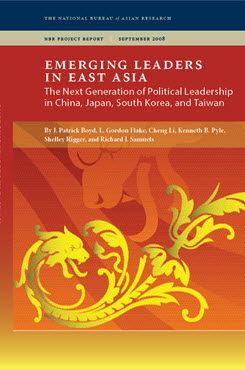From Emerging Leaders in East Asia: The Next Generation of Political Leadership in China, Japan, South Korea, and Taiwan
Political Generations in East Asia
The Policy Significance
In this introductory essay to the September 2008 report “Emerging Leaders in East Asia.” Kenneth Pyle synthesizes the overall findings of the Emerging Leaders in East Asia study as well as examines what distinguishes the next generation of leadership in East Asia.
The contemporary societies of East Asia have experienced more decisive generational change in the last several decades than any other region of the world. Because intergenerational value change is one of history’s locomotives, American policymakers need to accumulate intellectual capital about this process. It is not a subject that has drawn the attention it deserves. With the four states that are the subject of this National Bureau of Asian Research (NBR) study—China, Japan, Korea and Taiwan—the United States has its most important bilateral relations. In East Asia, the United States has more sustained military deployments, conducts more trade, and owes more of its national debt than in any other region of the world.
Policymakers, seeking to discern the trajectory of change in this region, must consider generational change as a critically important insight into the dynamics that will influence the future politics in these societies. Discerning the consciousness of new generations as they come of age and move toward their time on the stage of history gives indications of the concerns and mindset of the emerging leaders in the region. Generations are one of the producers of historic change. Generations are the creatures of history, but they are also the makers of history.
In this introductory essay, Kenneth Pyle synthesizes the overall findings of the Emerging Leaders in East Asia study as well as examines what distinguishes the next generation of leadership in East Asia.


